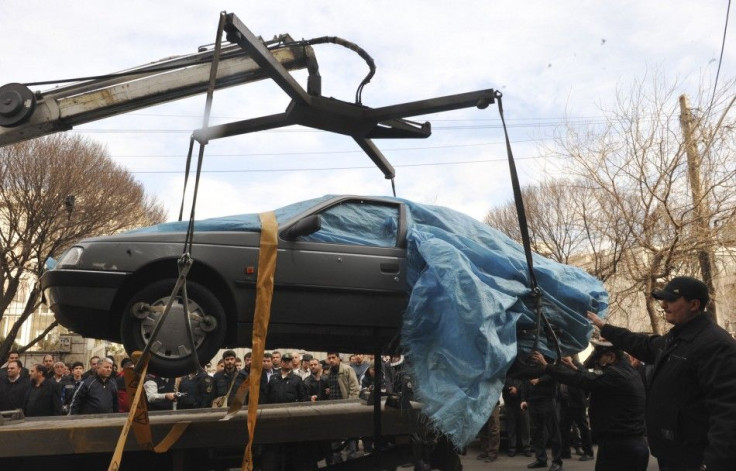Iran Nuclear Scientist 'Assassinated' by Car Bomb

An Iranian nuclear scientist was killed in a car bombing in Tehran on Wednesday.
Mostafa Ahmadi Roshan, a chemistry professor and a director at the Natanz uranium enrichment facility near Isfahan in central Iran, and his driver, Reza Qashqei, died after two assailants attached a sticky bomb -- in this case, an explosive device with a powerful magnet on it -- to his car.
The bomb was sophisticated enough to kill the two men, and injure a third without doing significant damage to the car. According to the BBC, the device was designed to only kill one or two people and was small enough not to be heard from far away.
The type of attack used on Wednesday was similar to that used in the killings of three other nuclear scientists in the past two years. Tehran University professor Masoud Ali-Mohammadi was killed in a motorcycle explosion in January 2010, and in November 2010 professors and nuclear scientists Majid Shahriari and Fereydoun Abbasi were killed by a car bomb.
A week after the November bombing, Iran declared that Israel, the CIA and Britain's MI6 were behind the attacks. The same was said after the attempted assassination of Fereydoun Abbasi, the head of Iran's Atomic Energy Organization, also in November 2010.
The Wednesday bombing is already begin blamed on Israel.
“The bomb was a magnetic bomb and is the same as those previously used to assassinate scientists. Iranian scientists. And the fact is that this is the work of the Zionists, Safar Ali Baratlo, Tehran's deputy governor, said on Wednesday.
“It seems that the Zionists’ efforts are meant to undermine security ahead of the elections so that the people would not turn out in great numbers.”
For Iran, Israel is always militarily supported by the U.S., and Iran's leadership believes that Israel wouldn't act without U.S. support or guidance.
This terrorist act was carried out by agents of the Zionist regime and by those who claim to be combating terrorism (the U.S. with the aim of stopping our scientists from serving, Ahmadi Roshan, Natanz facility deputy director, told state television.
They (Israel and the U.S.) should know that Iranian scientists are more determined than ever in striding towards Iran's progress.
Iran's Press TV said that Roshan served as the marketing deputy of the nuclear facility, while the Tehran Times said he was in charge of commercial affairs. The IRNA news agency said the scientist had “organizational links” to the Atomic Energy Organization, suggesting that he held a key position in a nuclear program.
“Many bad things have been happening to Iran in the recent period,” Mickey Segal, a former director of the Israeli military’s Iranian intelligence department, told The Associated Press.
“Iran is in a situation where pressure on it is mounting, and the latest assassination joins the pressure that the Iranian regime is facing.”
In November, an explosion at a military facility near Tehran killed 17 people, including Brigade General Hassan Moghaddam, who was thought to be in charge of the country's missile inventory. Iran called the blast an accident, but international speculation pointed toward Israel, suggesting that secret service agency Mossad had carried out the explosion.
The targeted base reportedly stored Shahab-3 missiles, which have a 1,200-mile range and are capable of hitting Israel. According to a November report from the International Atomic Energy Agency, Iran has in the past tried to make nuclear warheads that can fit on the Shahab-3.
Iran continues to maintain that its nuclear program is peaceful and being developed for research and energy purposes. But that hasn't stopped the United Nations, European Union and the U.S. from imposing sanctions on the country in an attempt to stop Iran's uranium enrichment.
The Islamic Republic recently announced that it had successfully tested its first fuel rod -- a necessary step in both peaceful and weaponized nuclear development -- and the IAEA said earlier this week that Iran has been enriching uranium in a heavily guarded underground bunker at levels beyond what is needed in peacetime.
After the attack on Wednesday, Vice President Mohammad Reza Rahimi made a public address, promising that Iran wouldn't stop making progress in its nuclear endeavors, according to The Associated Press.
Israel and the U.S. have denied involvement in all of the bombings.
© Copyright IBTimes 2024. All rights reserved.




















